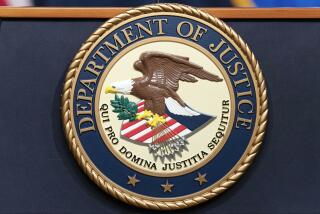U.S. Hopes Saudi Will Offer Clues to ’96 Blast
- Share via
WASHINGTON — U.S. authorities expressed optimism Tuesday that a Saudi dissident deported to the U.S. will now provide crucial leads about the perpetrators of last June’s terrorist bombing in Saudi Arabia that killed 19 American service personnel.
The suspect, Hani Abdel Rahim Hussein Sayegh, was sent from Canada on Tuesday in time for a federal court hearing today, according to Michael Wildes, his U.S. lawyer.
After weeks of on-again, off-again negotiations with U.S. law enforcement officials, plus a recent change in defense lawyers, Sayegh agreed to talk to FBI investigators in return for expulsion from Canada to the United States, Wildes said.
Officials said Sayegh might provide an answer to a key question about the bombing: whether it was ordered or supported by the Iranian government. Proof of Tehran’s involvement could lead to a retaliatory U.S. military strike against Iran.
Wildes refused comment on the extent of Sayegh’s cooperation or on his legal status in this country. He said he had negotiated an agreement with U.S. officials that is under seal.
One source said that Sayegh, in return for his cooperation, will not be charged in last June’s bombing but will plead guilty to conspiracy in connection with a planned, unrelated 1995 attack that was never carried out.
In dealing with the FBI, the Shiite Muslim religious activist has been coy about how much he knows about the explosion at the Khobar Towers military housing complex in Dhahran, U.S. sources said.
“The guy has waffled somewhat on what he wants to do,” one official said. “He’s trying to get the best possible deal for himself, and he fired his Canadian lawyer last month.”
Sayegh, 28, was caught in a legal bind when he sought political refugee status in Canada after arriving there in August. Canadian authorities denied his claim on the grounds that he was a terrorist, and they threatened to deport him to Saudi Arabia.
Because Sayegh passed through Boston en route to Canada, American officials immediately made a claim on him in the event that he was deported.
Sayegh too preferred deportation to the United States. He told authorities that he fled Saudi Arabia after his brother and a cousin were tortured and imprisoned for anti-government activities and that--as a vigorous opponent of the Sunni Muslim-dominated Saudi government--he fears the same fate himself. In addition, he is wanted there in connection with the bombing. His wife and two children remain in Saudi Arabia.
Canadian intelligence officials allege that Sayegh carried out surveillance on the Khobar Towers, drove an automobile that gave the go-ahead signal to the driver of a bomb-laden truck that carried out the attack, and assisted in the terrorists’ escape. He is believed to belong to an Iranian-linked terrorist cell.
In addition, Saudi intelligence sources have told the FBI that Sayegh lived in Syria and Iran for periods of time and served as a “talent scout” for Saudi Hezbollah, a militant Islamic group backed by Iran, by recruiting young zealots.
Full cooperation by Sayegh--if it is obtained--could mark the first investigative breakthrough for FBI officials in an attack that not only killed 19 but injured 384 people, including 109 Americans.
In fact, questioning of Sayegh would give the FBI its first direct access to a possible key participant. Until now, FBI officials have been frustrated by the unwillingness of investigators in Saudi Arabia to allow U.S. agents to interrogate dozens of suspects rounded up in that country last year.
Jackson reported from Washington and Turner from New York.
More to Read
Sign up for Essential California
The most important California stories and recommendations in your inbox every morning.
You may occasionally receive promotional content from the Los Angeles Times.









